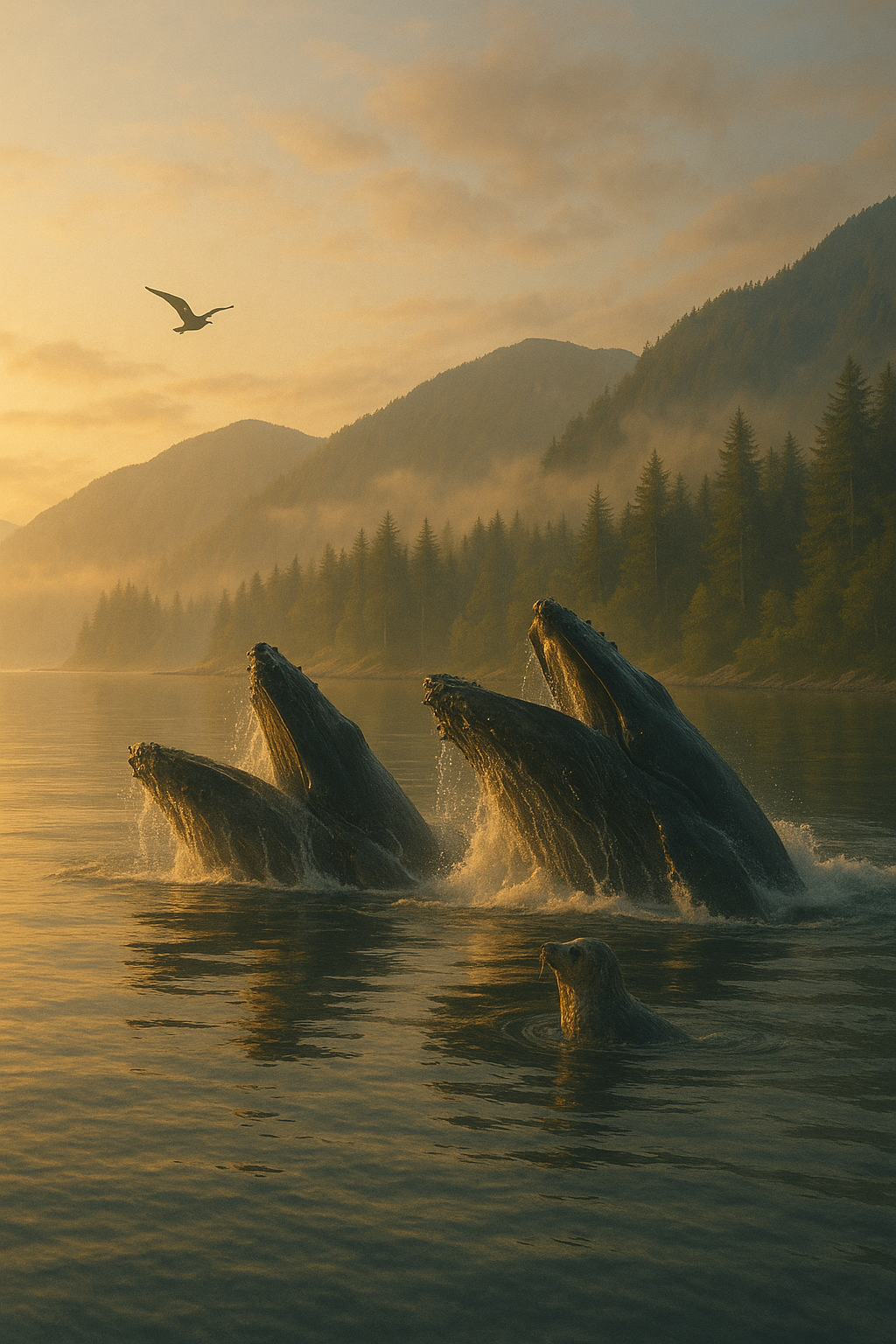Reflection Four in a Seven-Part Series on Encountering Transcendence in the Present Moment
I once heard the great cellist Yo-Yo Ma say, “Music is what happens between the notes,” and the statement has taken up residence in my heart ever since—like an unexpected houseguest who tidies your soul instead of your kitchen.
There is such truth in that simple yet profound sentence. And yesterday, it came swimming back to me—quite literally—as I woke with the whales in Icy Strait Point, Alaska. What an experience it was! I watched, breath held, as those leviathan behemoths of the deep (especially Ruffles and Wedgie) breached the surface again and again, feeding on krill and mackerel in a feast as ancient as the tides.
In some strange and wonderful way, I was reminded of Yo-Yo Ma. Perhaps it was the orchestration of these mighty creatures, moving with grace and rhythm as if conducted by a divine maestro hidden just beneath the waves. Or maybe it was the songs—yes, songs!—they sang in what seemed like joyous play, echoes of a language we once understood but forgot somewhere between evolution and email.
And there, in the quiet after the splash, I found myself thinking about the silence between the notes.
It is a peculiar thing, this silence. Not absence, mind you. Not the cold void of nothingness. But a presence so full and rich that it hums. It is the space that gives meaning to the music, the breath that makes the word audible, the pause that invites our hearts to catch up with the tempo of wonder.
We live, more often than not, in the notes—busy, productive, pressed for time. But what if the real music, the true resonance, is unfolding in the pauses? In the stillness between two tasks? In the quiet exhale before the next thing begins?
The whales reminded me that rhythm is as much about restraint as it is about movement. Their surfacing was dramatic, yes, but it was the waiting—the deep, still intervals—that made the appearance feel sacred. They were not performing. They were simply being. And that, I suspect, is the very heart of transcendence: presence without pretense.
So I am learning, slowly and with some resistance, to cherish the pauses. The awkward silences in conversation. The empty spaces in my schedule. The breath between thoughts. They are not blanks to be filled or problems to be solved—they are invitations.
Tomorrow, we’ll descend into the tender ache of “The Holy Ache of Longing,” where absence and desire meet in the sacred middle.
But for now, may you find your silence. And in that silence, may you hear the music you didn’t know was playing.






Music truly is the space between the notes, and your experience with the whales beautifully illustrates that. It’s fascinating how nature can mirror art in such profound ways. The way you describe the whales’ movements as an orchestration and their songs as echoes of a forgotten language is so poetic. It makes me wonder if we’ve lost something essential in our fast-paced, note-filled lives. Do you think we can learn to embrace the pauses more, to find that same sacred stillness the whales embody? Your reflection on presence without pretense is something I’ll carry with me—thank you for sharing such a thought-provoking perspective. How do you think we can bring more of that rhythm and restraint into our daily lives?
Thank you for this lovely and deeply perceptive response. I’m grateful that the image of the whales—as unlikely musicians of the deep—resonated with you. There was indeed something profoundly orchestral about that moment: not choreographed, but composed by a rhythm deeper than thought.
You ask a poignant question—have we lost something essential in our fast-paced, note-filled lives? I fear we have, or at the very least, we’ve misplaced it in the rush. The world seems to applaud the crescendo, the constant movement, the next big thing. But the whales reminded me that presence doesn’t have to perform. It simply is. And in that stillness, there is astonishing beauty.
Can we learn to embrace the pauses more? I do believe so. In fact, I think we must, if we are to live lives that are not just full, but whole. Nature is not in a hurry, and yet everything gets done. The tides come in, the stars find their places, the whales rise and fall with such grace it almost feels like prayer. The pauses—the rests—are not an absence of meaning, but the soil in which meaning grows.
The challenge, of course, is that our daily lives are not often conducive to such stillness. So how do we bring more of that rhythm and restraint in?
For me, it begins with a practice of noticing. Noticing the way light shifts in a room. The pause between one breath and the next. The quiet in a conversation where something true is being felt but not yet spoken. These small silences, when we let them be, become holy.
It’s also about resisting the urge to fill every gap—whether with noise, or answers, or activity. Sometimes, leaving a space empty is the most courageous thing we can do. Just as music needs its rests to make the melody sing, we too need our stillness—not as an interruption to life, but as its gentle centre.
And perhaps, if we can learn to attune ourselves to this quieter tempo, we might even begin to hear those echoes of the forgotten language you so beautifully named. The language of presence. Of being, not just doing.
Thank you again for listening so attentively—not just to the notes, but to the silence that cradles them.